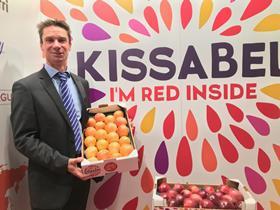
Interest in red-fleshed apples among growers and marketers has been growing for some time. As one of the most prominent players in the sub-category, Ifored has spent the past seven years working with partners in various different countries to develop production of varieties known collectively as Kissabel. Now, with the marketing of its first commercial crop underway, we speak to project manager Emmanuel de Lapparent about the path ahead.
In which areas would you say production of Kissabel is most advanced at present?
Emmanuel de Lapparent: So far we have commercial production in the UK, France, Switzerland, Germany and Italy. So we have five countries which are starting to produce the apples. This year is really the first commercial crop and altogether we are around 500 tonnes. The volume is limited because they are coming from young orchards that have just been planted and are producing new fruits.
Between the varieties themselves, it’s a pretty even split at the moment. The red one is commercially produced in Italy, Germany and Switzerland; the yellow one is produced in the UK, France and Switzerland, but in future it will also be grown in Italy; and in the near future there will be production of the red one in France. Things will evolve.
Do you expect that all of your partners will eventually produce all three of the varieties currently in development?
EdL: There are actually more than three varieties. When we say three, it means we have three colours. Behind the red colour, we already have two varieties. Today, we talk about Kissabel Rouge, Orange and Jaune. But the Ifored group has made a decision to segment them differently in future, and we will launch this next year to provide more explanation. Kissabel is a range of varieties that will have many red, many yellow and many orange apples.
What is the ultimate goal for Kissabel as a brand?
EdL: As a brand, we want to own the red-fleshed apple category. That’s our objective. We want the consumer, when they think about red-flesh apples, to think about Kissabel. Then in the supermarket, they say ‘I like acid apples, so I’m going to buy a Kissabel with an acid taste’ or ‘I prefer the sweet Kissabel’. We want the consumer to think of Kissabel when they think of red flesh.
What kind of conversations are you and your partners having with customers, especially the retailers? What kind of trading relationship can they have with a brand like yours?
EdL: At the moment, the idea is simply to promote the master brand Kissabel. With this first commercial crop, we want to put the product in the hands of as many people as we can. So there is no restriction at this stage and any retailer that wants to test the apples needs to approach the Ifored partners. We have a few boxes for sale but it’s very, very small.
This year, the apples are on sale right now in the UK, France, Germany and Switzerland, while in Italy they will start in November. We want to get feedback from consumers. We have people in the supermarkets organising tastings so that we get the maximum level of feedback possible.
What about in three to five years’ time? What’s the plan for consumer marketing in the years to come?
EdL: Nothing has been decided yet. It’s a work in progress. But one thing is for sure; brand promotion will be very strong, because if we want to exist and be well known among consumers, we have to work hard to promote this brand. It’s a very nice brand with a very nice logo, so I think we need to use these strengths,
The Kissabel project includes some of the biggest names in apple marketing. Do you expect others to want to be involved in future?
EdL: We do expect the group to grow, yes. But is this in the near future or later on, we don’t know. The focus at this stage is to become a success. Then probably the group will grow based on this success, with growth in new production and selling areas. At this stage we have the core group.
The focus is definitely global. The project began in Europe because that’s where the partners have already more experience with growing the variety and testing the market. But I can tell you that our US partners have already chosen to start commercial planting of a red variety. In the Southern Hemisphere, we think they might make a decision on which varieties to plant in commercial orchards in 2020 based on what they see in the test trees. They need to see which varieties work best in the growing conditions and which ones are right for their markets.
This is presumably all geared towards having year-round supply, correct?
EdL: That’s the idea. The Kissabel brand has to be on the shelf for 12 months of the year. That’s why we need Northern and Southern Hemisphere supply. Realistically, year-round supply is probably only going to be a reality in 2025. This is not long in fruit industry terms, of course; you need time to plant the commercial orchards, let them grow some apples and so on.
More generally, how do you see the market for red-fleshed apples evolving in the coming years?
EdL: What we think is that there is a market for red-fleshed apples and we see it as a great innovation in the apple category. For our partners, the idea is for people to eat red-flesh apples as well as white-flesh ones, not instead of them. The look is very different, the taste profile is unique, so we think people will buy them in addition to more traditional varieties. I think for the first time, we are bringing true innovation to the shelves.



